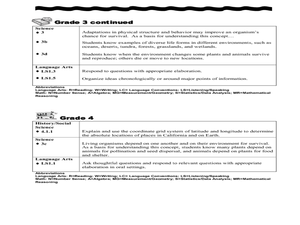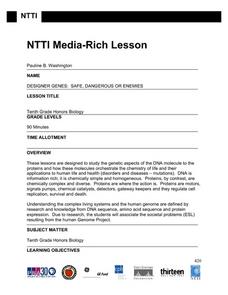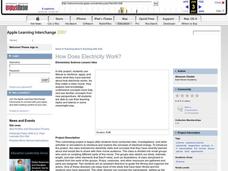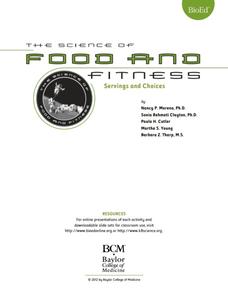Curated OER
Vibrating Objects Produce Sound
Students use many different materials and resources in order to study and identify sounds that are loud or soft, high or low, pleasant or unpleasant.
Curated OER
Energy from the sun
Students put two thermometers outside on dark and light colored paper and predict which will get the hottest. In this thermometer lesson, students predict and record their results of the hottest thermometer.
Curated OER
Earth Pockets
Students identify the Earth's natural resources. In this Earth science lesson, students read the book The Great Kapok Tree and discuss types of natural resources. Students use categories such as wood, paper, and trees and list items that...
Curated OER
Taking Charge of our Earth and its Resources
Students identify natural resources, discuss conservation and protection of them, and identify how pollution is harmful to the environment. Seven lessons on one page.
Curated OER
MagLev Train System Activity
Students are able to analyze practices that affect the use, availabiltiy, and management of natural resources. They are able to show that the forces of friction retards motion. Students investigate electricity and magnetism as...
Curated OER
A Tree Is More than a Street Name
Eighth graders discuss the role of trees as one of the most important natural resources. In groups, they examine how the forests nearby helped to shape their urban city. Using the internet, they research the use of the forest in early...
Curated OER
You're Eating More Energy Than You Think!
Young scholars investigate the concept that different forms of packaging require different amounts of energy.
Scholastic
Study Jams! Sound
Listen in as Mia and Sam expound on sound. It is caused by vibrations and travels in waves. It has the qualities of pitch, frequency, and volume. This hip animation displays a graph to depict the frequency and amplitude of sound waves....
Curated OER
Bounce Back - The Long and Short of It
Upper elementary scientists test basketballs with differing amounts of air to find if inflation affects bounce height. The lesson introduction poses the question of whether or not the composition of a ball determines bounce height, but...
Curated OER
Temperature and the Tomato
You will need a photovoltaic system and monitor at your school in order to obtain all of the data required to thoroughly implement this lesson. Your class monitors daily temperature and insolation amounts over a two week span of time....
Curated OER
Cooler In The Shadows
Students investigate the concepts of shadows and how they are projected with objects different positions in relation to the sun. They conduct an experiment by observing objects in different positions. Then students record the observations.
Curated OER
Electricity and Magnetism: From Fun to Function
Fourth graders experiment with electricity and magnetism and build an electromagnetic motor. In this electromagnetism lesson, 4th graders use household objects to show electrostatics and magnets and compasses to show magnetism. They...
Curated OER
How Does Electricity Work?
Students use iMovie to reinforce, apply, and share what they have learned about how electricity works by making a movie as a unit culminating activity.
Baylor College
Servings and Choices
An important part of balancing caloric intake to energy expenditure is knowing how many Calories you are consuming. In the fifth of a seven-lesson plan series on food and energy, learners estimate their daily caloric intake, then use a...
Curated OER
Energy Dreams by Design
Young scholars explore a new home and design some of its electrical features. They construct a model of the electrical features and consider accessibility for the handicapped into the room. In groups, students analyze the advantages and...
Curated OER
How Do Plants and Animals Get Energy?
In this food chain worksheet, students will determine where plants and animals get their energy by filling in the blank of 4 statements.
Curated OER
How Does Energy Cycle in Ecosystems?
In this energy cycle worksheet, students will write in examples for each trophic level in an energy cycle: top, middle, and lowest levels.
Curated OER
How is Thermal Energy Transferred?
In this thermal energy worksheet, students will write down the key facts and vocabulary words associated with heat and thermal equilibrium, transfer of thermal energy, conductors and insulators, and heat capacity. This worksheet is a...
Curated OER
Pushes and Pulls
Students discuss and investigate how various vehicles move. In a small groups, students then create a wheeled vehicle and find a way to make it move using various resources provided by the teacher.
Curated OER
How Do People Get Energy?
In this food energy activity, learners will write in examples of different foods that fit into the four food groups: grains, protein, fruits and vegetables, and milk products.
Curated OER
How Does Energy Flow in a Food Web?
In this food web worksheet, students will write down the 4 steps energy takes as it flows through a food chain. This worksheet is a graphic organizer.
Curated OER
To Renew, or Not to Renew
Learners explore the various types of renewable energy. After reading articles, they discover the advantages and disadvantages of renewable energy. They also explore the challenges to switch over to using more and more renewable energy...
Teach Engineering
Solar Angles and Tracking Systems
The sun will continue to rise in the east and set in the west, no matter what. The first lesson in a series of eight introduces the class to solar angles. It makes connections between a person's latitude and the angle of position of the...
Curated OER
Green Team
Student explore the relationship of static electricity to current electricity, circuits, electromagnets, electro generators, and public electric utilities. In this Green Team lesson plan, 4th graders participate in hands-on science...

























